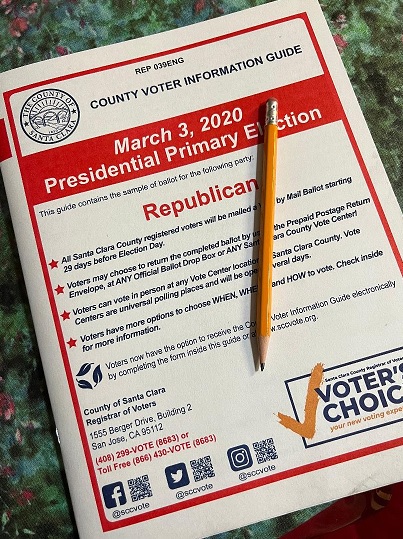August 2023 Newsletter Articles
New Presidential Primary Rules Aim to Boost GOP Turnout
 On Saturday, July 29, the CAGOP adopted new rules which change the March 2024 California Presidential Primary to a proportional system from the previous winner-take-all by congressional district. This new system awards delegates to GOP Presidential candidates based on their percentage of statewide primary vote.
On Saturday, July 29, the CAGOP adopted new rules which change the March 2024 California Presidential Primary to a proportional system from the previous winner-take-all by congressional district. This new system awards delegates to GOP Presidential candidates based on their percentage of statewide primary vote.
The change was made to comply with Republican National Committee rules which require all Presidential primaries held before March 15 of the Presidential election year to be proportional. California sends the nation’s largest delegation to the Republican National Convention. It is composed of 169 delegates and is made up of 3 delegates per congressional district, 10 at-large delegates, and three members of the Republican National Committee.
The new rules are expected to bring more Presidential candidates to campaign in California since candidates who win even a modest percentage of the statewide vote can come away with a significant number of delegates. Any candidate who wins 50% plus one or more of the statewide primary vote will receive 100% of the delegates.
After the adoption of the change, Chairwoman Jessica Patterson stated “Republican presidential candidates will not only be encouraged to spend real time campaigning in our state and making their case to voters, but Republican voters will equally be encouraged to turn out to support their chosen candidate to help them win delegates.” Increased Republican turnout in the March 5 primary would help Republican candidates across the state qualify for the top two runoff election in November.
The change was made by the Executive Committee of the California Republican Party which met in Irvine at the call of Chairwoman Patterson. RNC rules require all changes to the presidential primary rules to be submitted to the Republican National Committee by October 1st of the year prior to the Presidential primary. Party leaders felt it was too great a risk to wait until the September 29-October 1 convention to make changes, since failure to adopt rules by that deadline would result in a penalty which could reduce California’s delegation by 50%.
Under the new system, candidates who win delegates will select individuals to fill those positions descending order based on the primary results. RNC rules require the delegation to include at least 3 delegates who reside in each Congressional district.
According to CAGOP rules, only registered Republicans may vote in the Presidential Primary. Therefore it is important for voters who wish to participate in the primary to confirm that they are registered Republicans. Most county registrars allow voters to check their registration on line. Voters may register as Republicans on line at the CAGOP website https://www.cagop.org/s/voter-registration.
BART Challenges Continue:
Financial Management and Leadership Needed
By Roger Riffenburgh

Much has been reported in recent months about the “fiscal cliff” facing transit agencies in general and the Bay Area Rapid Transit district in particular. According to BART figures, its ridership is well under half of what it was in pre-pandemic times. Remote work and empty San Francisco buildings have significantly cut demand for BART’s service and, with it, operating revenue. Before the pandemic, revenue from fares provided a solid majority of BART’s income; now fares provide less than a third, with temporary federal emergency assistance filling the gap.
In a typical company, when demand for its service drops, the company cuts back production by reducing staff and other costs. But not at BART. The East Bay Times’ Dan Borenstein explains that BART’s “response to plummeting ridership and a $1 billion budget shortfall over the next five years is to increase spending, hire more workers, run more trains and insist that taxpayers bail out the Bay Area’s largest commuter rail system.”
State Senator Steve Glazer, a Democrat and a public transit supporter, has been critical of BART financial oversight and successfully led the effort to create a BART Inspector General in 2017. After the Alameda County Grand Jury found that BART leadership often blocked the IG, Glazer pushed ahead legislation to increase the IG’s independence. The governor vetoed this legislation, reportedly at the request of the BART board.
The Legislature came through with a public transit bailout plan which handles BART’s immediate fiscal problems, but not the long term. Dan Borenstein says, “The one voice of reason on the BART board is Director Debora Allen.” In a recent Mercury News article, Allen laid out her suggestions for reform. She says that since BART is putting increasing costs on the taxpayers, BART should be subject to review by a state commission, much as the state does for school districts facing bankruptcy. Since labor costs are over 77% of operating costs, current contracts should be reconsidered for work rules and benefit levels. To prevent inappropriate influence by vendors and labor unions, she suggests a $500 campaign contribution limit per election cycle. And finally, “the Office of the BART Inspector General should be moved out of BART control and put under the direction of the Caltrans inspector general or the State Auditor’s Office.”
BART might also benefit from some new leadership with more financial experience and from more public scrutiny. One may attend BART Board of Directors meetings in Oakland, on alternating Thursdays, and the meetings are also available online. The five odd-numbered seats on the board are up for election in November 2024. Two seats or more will be open. Bevin Dufty, who strongly supports housing developments on BART parking lots and represents part of San Francisco, will be retiring, while Lateefah Simon, who introduced a transit sanctuary policy and represents part of Oakland and western Contra Costa County, is running for Barbara Lee’s congressional seat. Candidate filing opens in July 2024, but some campaigns are already underway.

